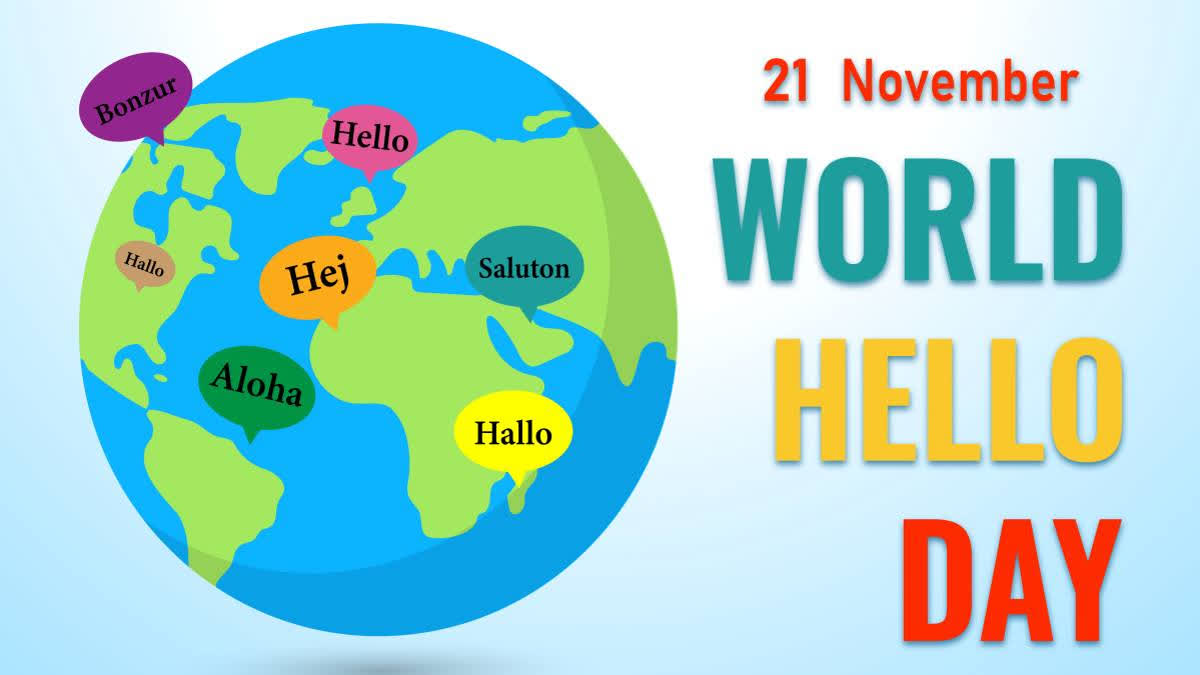World Hello Day (November 21): A Simple Greeting That Can Change the World
On November 21 each year, people around the world celebrate World Hello Day—a day dedicated to the belief that simple communication can reduce conflict, strengthen relationships, and promote peace. Created in 1973 in response to global tensions, particularly the Yom Kippur War, the day encourages people to greet at least ten others to demonstrate the importance of personal interaction in preserving peace.
At first glance, the idea may seem disarmingly simple: say “hello” to ten people in a single day. Yet behind this gentle request lies a profound message about human connection. In a time when digital communication is instant but emotional closeness can feel distant, and when societal divisions seem sharper than ever, the power of a genuine greeting becomes especially meaningful.
This article explores the history, cultural significance, psychological impact, and modern relevance of World Hello Day—and why the act of saying “hello” still matters today.
1. The Origins of World Hello Day
World Hello Day was founded by two American brothers, Brian and Michael McCormack. Alarmed by the outbreak of the 1973 conflict in the Middle East, they sought a simple yet powerful action anyone could take—no matter their nationality, language, or background. Their idea was elegant: encourage people to reach out to one another through a friendly greeting, symbolizing the first step toward dialogue instead of conflict.
They mailed letters about their initiative to world leaders, embassies, and governments. Over time, the message spread. Today, World Hello Day is observed in more than 180 countries, and over 40 Nobel Peace Prize winners have endorsed the campaign, recognizing its power to promote peace through interpersonal connection.
The day stands as a reminder that peace starts not at high-level negotiations, but in the ordinary daily interactions between individuals. Even a simple “hello” represents openness, respect, and a willingness to acknowledge another person’s existence.
2. Why Greetings Matter: The Psychology Behind a Simple “Hello”
Though short and effortless, the word “hello” carries surprising psychological weight. Researchers in communication, sociology, and psychology agree that greetings play a foundational role in building trust and social connection.
2.1 Greetings affirm human presence
Human beings have an innate need to feel seen and acknowledged. A greeting communicates: I notice you. I respect you. You exist and matter.
This simple acknowledgment can lift someone’s mood, reduce feelings of loneliness, and create a sense of belonging.
2.2 Greetings reduce social tension
In many cultures, greetings act as a ritual to ease social awkwardness. Before sharing ideas, negotiating, or working together, people often exchange greetings to establish rapport.
A warm “hello” or a friendly smile can:
reduce perceived social distance
increase cooperation
set a positive emotional tone
These subtle effects of greeting rituals help maintain harmony within communities.
2.3 Greetings open the door to communication
The first word in any conversation influences everything that follows. A greeting is not just a courtesy—it is an invitation for dialogue.
In a world where misunderstandings can escalate quickly, the ability to initiate healthy communication has profound significance. Saying “hello” is often the first step toward empathy, understanding, and resolution.
2.4 Greetings spread positivity
Studies in positive psychology show that small positive interactions—like greeting a neighbor or smiling at a colleague—create ripple effects. The emotional uplift spreads from person to person, improving overall well-being in workplaces, schools, and communities.
In this sense, World Hello Day is not only about preventing conflict but also about fostering everyday happiness.
3. The Global Diversity of “Hello”
One of the beautiful aspects of World Hello Day is how it highlights the linguistic and cultural diversity of greetings. Across the world, people say “hello” in countless ways—some formal, some casual, some accompanied by unique gestures.
Here are just a few examples:
English: Hello / Hi
Chinese: 你好
Japanese: こんにちは
Korean: 안녕하세요
Arabic: مرحبا (Marhaba)
French: Bonjour
Spanish: Hola
German: Hallo / Guten Tag
Swahili: Jambo
Hindi: नमस्ते (Namaste)
Thai: สวัสดี (Sawasdee)
Russian: Привет / Здравствуйте
Each greeting carries cultural meaning, traditions, and sometimes even specific etiquettes—like bowing in Japan, cheek kisses in parts of Europe and Latin America, or hand-over-heart gestures in the Middle East.
World Hello Day encourages people to appreciate this diversity and explore how different cultures express kindness and respect.
4. “Hello” in the Digital Age—More Important Than Ever
While the world becomes increasingly connected through technology, paradoxically, many people feel more isolated. Messages are often brief, automated, or transactional. Video calls replace in-person contact; social media replaces face-to-face conversation.
In this digital environment, the spirit of World Hello Day becomes more important than ever.
4.1 Restoring the human touch
A genuine greeting—spoken aloud, typed with warmth, or delivered face-to-face—can add humanity back into our interactions. Even online, a thoughtful “hello” can soften conversations and remind us that real people are behind our screens.
4.2 Counteracting loneliness
Studies show rising levels of loneliness globally, especially among young people. Simple social interactions, even micro-interactions like saying hello to neighbors or clerks, can significantly reduce feelings of isolation.
4.3 Encouraging mindful communication
Digital communication is fast, but not always meaningful. World Hello Day reminds us to pause and engage mindfully with others, even in virtual spaces—by using greetings that express sincerity instead of automated politeness.
5. How to Celebrate World Hello Day
Unlike many global observances that require elaborate events, World Hello Day is intentionally simple and accessible. Anyone, anywhere, can participate without any cost or special preparation.
Here are meaningful ways to celebrate:
5.1 Say “hello” to ten people
This is the heart of the observance. The ten people can be:
family members
friends
co-workers
neighbors
strangers you meet throughout the day
The goal is not just to speak a word, but to make genuine connections—even brief ones.
5.2 Reach out to someone you’ve lost touch with
Send a short message or make a call to someone you haven’t spoken to in a while. A simple greeting can reopen meaningful relationships.
5.3 Practice greetings in other languages
Learn how to greet someone in a new language—an excellent way to broaden cultural understanding and celebrate diversity.
5.4 Do a kindness with your greeting
Compliment someone. Hold the elevator and say hello. Greet the security guard, the delivery person, or the barista by name. These small gestures leave lasting warmth.
5.5 Teach children the importance of greetings
In a world full of distractions, teaching children to acknowledge others with respect helps shape a more empathetic generation.
5.6 Host a community greeting campaign
Schools, offices, or local groups can organize greeting boards, social media challenges, or “hello walls” where people write greetings in different languages.
6. Stories and Examples: How a Greeting Changed a Relationship
To appreciate the power of a simple greeting, consider these kinds of real-life examples seen in workplaces, neighborhoods, or families worldwide:
6.1 The neighbor who finally smiled
Many people live next to neighbors for years without speaking. A friendly “hello” one morning can break years of silence and lead to a supportive community relationship.
6.2 The co-worker who feels included
In workplaces, especially stressful ones, people sometimes become invisible. Greeting a colleague warmly can make them feel valued, increasing motivation and cooperation.
6.3 The stranger who needed connection
A kind greeting to someone looking down or stressed can brighten their day more than you realize. For some, that moment might be the gentle encouragement they desperately need.
These examples show that while we cannot always change someone’s life, we can change a few moments in their day—and those moments matter.
7. World Hello Day and the Broader Message of Peace
Beyond friendly interaction, World Hello Day carries a deeper mission: promoting peace.
7.1 Dialogue reduces conflict
The founders believed—and psychologists agree—that communication is the first step toward resolving differences. Conflict often escalates when people stop talking. A simple greeting may not solve global crises, but it symbolizes the willingness to communicate, which is essential for peace.
7.2 Personal peace contributes to global peace
Wars may be fought by nations, but peace begins with individuals. When people cultivate respect, empathy, and openness in daily life, these qualities ripple outward to families, communities, and societies.
World Hello Day reminds us that peace is not just the absence of war—it is the presence of connection.
8. Why We Still Need a Day Like This
Some may wonder: in a world with so many serious problems, is a day dedicated to saying “hello” meaningful enough?
Yes—because many major issues are rooted in lack of understanding, empathy, and dialogue. Divisiveness grows where communication breaks down. Racism feeds on ignorance. Hatred grows in silence. Mistrust thrives when people stop acknowledging each other.
World Hello Day offers a counterbalance: a celebration of human connection that highlights our shared humanity. It encourages us to see one another not as strangers or opponents, but as fellow human beings.
A greeting is the first step toward:
friendship
understanding
collaboration
reconciliation
and peace
It may be simple, but it is powerful.
9. A Reflection for This Year’s World Hello Day
This year, on November 21, as the world continues to navigate challenges—economic uncertainty, geopolitical tensions, digital overload, and social fragmentation—the message of World Hello Day feels especially timely.
A greeting may not fix everything, but it creates a moment of harmony in a world that deeply needs it.
So today, whether you say:
Hello
Hi
Hey
Good morning
Ni hao
Bonjour
Marhaba
Hola
Sawasdee
or any beautiful greeting from your culture—
say it with sincerity.
You never know who might need it.
You never know what change it might spark.
And you never know how many hearts you might touch simply by starting with a hello.





